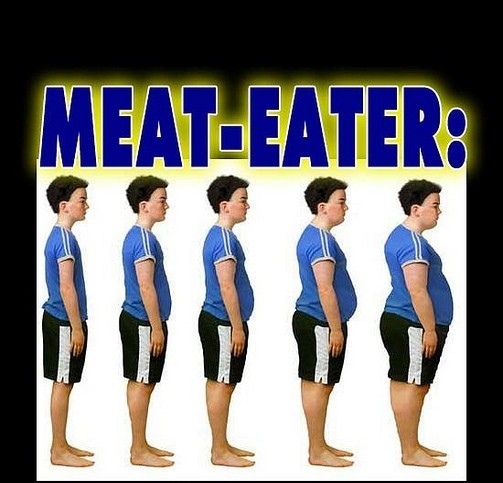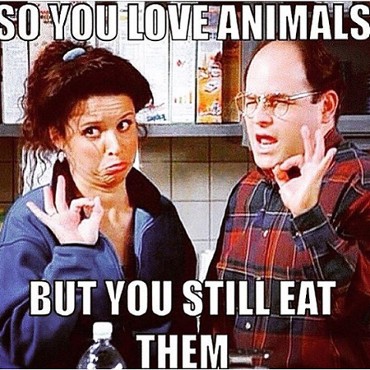Have humans really been designed to eat meat or is meat-eating something that rather derives from family habits and cultural traditions? That’s the issue Marta Zaraska discusses in her book saying that human beings were never supposed to be carnivores at all. In fact, her thesis becomes even more explosive facing the increasing demand for meat not only in North America and Europe but much more in Asia and especially in China where meat consumption has even quadrupled since 1980. The good news is that craving for meat could soon be resolved by offering a plant-based meat alternative instead which is not only a great but also a much more healthier option that animal-based meat.
“I encounter claims that humans were designed to eat meat — that it’s in our genes, that we have teeth made for eating meat, that we need meat to get all the right nutrients — all the time in casual conversation and in media in stronger and weakerversions.
In Meathooked: The History and Science of Our 2.5-Million-Year Obsession with Meat, science writer Marta Zaraska does a great job of exposing these claims as myths.
Vegetarian animals ranging from gorillas to water deer, she reports, have bigger, sharper canines than we do; our canines aren’t specially meant for processing meat. What we lack dentally is more important, in fact, than what we have. Gently open a (calm) dog’s jaw, and there at the back will be the carnassial teeth, “blade-like and sharp and perfect for slicing meat.” Lions and tigers, racoons and house cats — all carnivores — have them too. We don’t.
All the high-quality amino acid proteins we require are readily available in plants, Zaraska says, listing soy, buckwheat, quinoa and potatoes as examples.
Neal Barnard of the Physicians Committee for Responsible Medicine even notes that when people switch from meat-eating to plant-eating, their intake of vitamins and other nutrients improves.
True, vitamin B-12 is an exception: It’s found only in meat, eggs and dairy. Vegetarians, then, still do fine (because of the eggs and dairy); vegans need to eat foods fortified with B-12 or take a supplement.
Meat isn’t necessary to keep us healthy.
Zaraska wrote Meathooked primarily to discover why humans across the world crave meat. Factors of biology, including certain genetic predispositions and culture, ranging from family habits and cultural traditions to the sexual politics of meat as explained by Carol J. Adams, all play a role, she says.
I think the meat-myth-busting, too, is a central contribution of the book — and I’d like to take it even further.
Zaraska raves about the fake meat she samples in the Netherlands (“succulent … rich in flavors”) and recommends that we all eat vegetables, legumes, fruits and grains rather than meat from animals. But a set of statistics laid out right at the start of the book frames her entire discussion in a grim way.”
Read the full article at npr.org!








For me, it goes like this….
Ignoramuses claim “we are carnivores by nature”.
Well…unbeknownst to them, them brainwashed, indoctrinated, and ignorant fools they are; they are actually NECROVORES. They blindly ingest days to weeks old, dead, rotting animal flesh!
I have never yet seen a human jump out of a moving vehicle, to hop a fence, in order to chase down a cow and take a bite out of its$#%&!@*while it is alive because “they are a carnivore” and the cow is their prey.
That is what a carnivore does though…wake up sheep. We are herbivores by nature…man was just too dumb way back when and we have evolved since, yet so many want to hold onto past ignorant ways. #EvolvePlease 🙂
Ewwwww
I read until she said B12 is only found in eggs, meat and dairy. That’s bullshit. B12 is created by microorganisms, such as in dirt. Animals get B12 substitute too because their food is lacking it (mostly processed corn and soy). I mean, where would the cow as a herbivore get its B12 from? Magic?
Felipe Rios closer to the right already
No, from the microbial protein that ruminants consume by way of their rumen, which is one of their four stomachs. People, and all monogastrics, only have one stomach.
I’m late, but here’s a few lines from Wikipedia: “No fungi, plants, nor animals (including humans) are capable of producing vitamin B12. Only bacteria and archaea have the enzymes needed for its synthesis. Some plant foods are a natural source of B12 because of bacterial symbiosis.”
F.e. microorganisms in dirt or water.
I rarely wash organic and home-grown produce, so I’ve never had B12 problems, and I don’t often take B12 supplements.
B12 is found in animal digestive tracts, but only because they consume it through plants contaminated with dirt. In the mass industry, corn and soy are cleaned so much they don’t contain sufficient B12, so the animals get a supplement.
Human beings are frugivores.